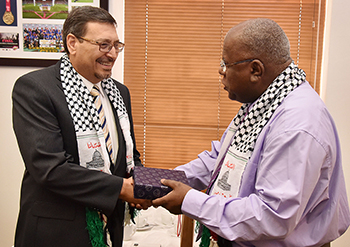Latest News Archive
Please select Category, Year, and then Month to display items
13 August 2024
|
Story Anthony Mthembu
|
Photo Sibahle Dayimani and Amandla Kulu
 Prof Peter Roseel, Managing Director of Management Consulting and Research – a spin-off of the Catholic University of Leuven in Belgium; and Prof Nicolene Barkhuizen, Director of the UFS Business School.
Prof Peter Roseel, Managing Director of Management Consulting and Research – a spin-off of the Catholic University of Leuven in Belgium; and Prof Nicolene Barkhuizen, Director of the UFS Business School.
The Business School at the University of the Free State (UFS) hosted Prof Peter Rosseel, Managing Director of Management Consulting and Research – a spin-off of the Catholic University of Leuven in Belgium – for a guest lecture during his visit to the UFS Faculty of Economic and Management Sciences (EMS).
The guest lecture took place on 19 July 2024 in the Business School Auditorium and was attended by academics from the UFS.
Reflecting on the lecture
The lecture presented by Prof Rosseel focused on how combining strategy, strategy implementation, culture transformation, leadership, and learning successfully leads to sustainable growth, creates engagement, and delivers tangible results. Throughout the lecture, Prof Rosseel spoke about how experts tend to make bad leaders and therefore stop change from happening within an organisation. In fact, he highlighted that, “Experts stop change from happening within the workplace because experts, by definition, look through the eyes of their expertise, but you cannot reduce the world to different forms of expertise, as it is holistic.” As such, he argued that to change an organisation, one must see things from the point of view of others.
Furthermore, Prof Rosseel delved deeper into the hierarchical operating model within organisations. He indicated that the above model should be one community within organisations; however, unfortunately it is not. This is because organisations are made up of several departments such as finance and human resources. As such, he regards these departments to be silos that could prove to be detrimental to organisations, as each silo can create its own culture as opposed to an organisational culture. These are some of the points he discussed throughout the lecture.
After the lecture concluded, the audience had the opportunity to engage with Prof Rosseel on his viewpoints. In fact, Lyle Markham, Academic Head of Department and Lecturer in Industrial Psychology at the UFS, was one of the audience members and described the lecture as insightful.
Palestinian delegation visit marks new bilateral relations
2015-11-27

Prof Jonathan Jansen and His Excellency Mr Hashem Dajani
Photo: Charl Devenish
|
The Office of International Affairs hosted the official visit of the Ambassador of Palestine, His Excellency Mr Hashem Dajani, to the University of the Free State (UFS) on 16-17 November 2015. Prof Jonathan Jansen, Vice-Chancellor and Rector of the UFS, welcomed the Ambassador and the Palestinian delegation to the Bloemfontein Campus. During the visit, they met with senior management of the university, including Dr Karen Lazenby (Registrar: Systems and Administration), Beata Mtyingizana (Director of International Affairs) and JC Van der Merwe (Deputy Director at the Institute of Reconciliation and Social Justice).
The visit marked the finalisation of a scholarship initiative which offers placement of Palestinian students to study at the UFS. The new Vice-Chancellor’s International Scholarship programme will recognise academic excellence and merit in undergraduate, postgraduate, as well as doctoral academic disciplines.
One of the strategic objectives of the UFS is that of internationalisation, which is strengthened by the scholarship programme. With the focus on Palestine, the university’s international footprint in non-traditional regions of the world, such as the Middle East, will therefore be highlighted.
To conclude the visit, the Institute for Reconciliation and Social Justice hosted a film screening featuring ‘Jerusalem, the east side story’. The documentary mainly looks at the past forty years of Israeli military occupation policies in Jerusalem and the subsequent impact on the city and its people.
“Peace in Palestine is key to world peace,” Ambassador Dajani said. “The issue of self-determination is central to the Palestinian effort, and, through the assistance of the international community, it can it be realised.”